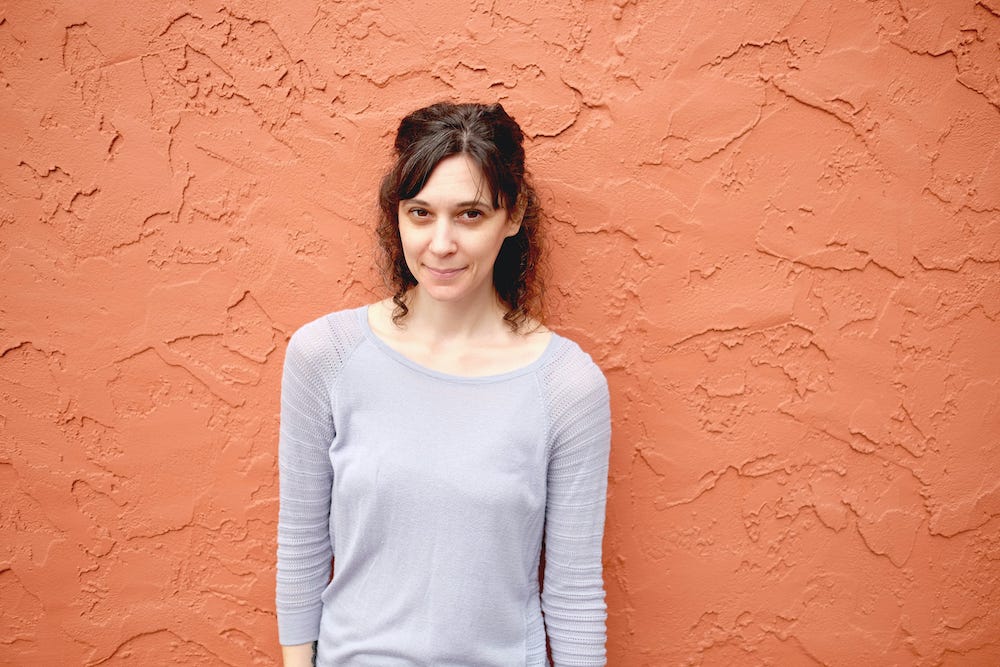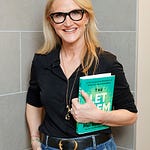You're listening to Burnt Toast. This is the podcast where we talk about diet culture, fatphobia, parenting, and health. I'm Virginia Sole-Smith and I also write the Burnt Toast newsletter.
Today I am chatting with Dana Miranda. Dana is a certified educator in personal finance and the founder of Healthy Rich, a platform for inclusive budget-free financial education. As a personal finance journalist, Dana has written about work and money for publications, including Forbes, the New York Times, CNBC, NextAdvisor, Insider, and Inc. Magazine.
So, you might be thinking, wait, what does budgeting have to do with diet culture? To which I say: Oh, my friends, so so much. It turns out that tracking expenses is not all that different from tracking calories, in terms of its impact on our wellbeing and its ultimate success rate. Dana is here to explain why budget culture causes harm, why budgeting doesn’t work, and how to start to rethink your relationship with money.
I got so much out of this conversation. And I fully expect you to have even more questions after you listen, because I think this whole idea of an anti-budget approach is so new to most of us. So, please tell us what you think!
Post-Publication Note from Virginia:
I want to thank everyone who participated in the comments on this podcast episode. This is (I think?) the first time I’ve published something here that really did not land with lots of you. It was bound to happen! I swing at a lot of pitches! You all named some very valid reasons for why this one missed for you, and if Dana and I were to do the interview over again, we’d take the conversation in a few different directions—to better acknowledge the role privilege plays both in the ability to budget AND in the ability to reject budgeting, and to make it clearer that we were questioning systems and critiquing the marketing of budget culture, not giving personal finance advice (I know it got murky at the end when I asked for tools!).
I also think this conversation hit a nerve at least in part because Dana does articulate so well some drawbacks and risks to budgeting that aren’t comfortable to name or look closely at. So I will continue to investigate how restriction, perfectionism and the myth of personal responsibility (all diet culture hallmarks!) show up in how we think about money and so many other aspects of life.
All of that being said: As I was reading through the discussion, I just kept thinking how much care everyone was putting into their critiques. You helped me see how the conversation I published didn’t go far enough, and where it missed the mark. And you did so with such kindness and grace. I appreciate how willingly you come along for the ride when I take us in new directions but I appreciate even more that this is a community that offers smart constructive criticism and holds me accountable. Please keep doing that!
Episode 57 Transcript
Virginia
Hi, Dana! Let’s start by having you tell us just a little bit about yourself and your work.
Dana
So I worked as a freelance writer for 10 years. Writing is my background. And I was just kind of getting by for about five years. I started in personal finance media in 2015, when I got my first full-time job working at The Penny Hoarder, a media startup in personal finance. I really had no personal finance background when I did that, I just got into it because it was a writing job and I liked the team. And I thought, I’ll try it out. Personal finance sounds really boring, but let’s see! It’s writing.
I found that I really enjoyed the things that I was writing about because I was able to learn so much about our financial systems, like what goes into a credit score. I hadn’t been making a lot of money. I grew up working class and didn’t learn a lot about personal finance from my parents or my community. I just kind of buried my head in my 20’s around anything to do with money. So it was so fun to start learning about it.
Then, as I got deeper into it, I started freelancing and writing for more sites and also working with some financial technology companies. I learned that the space is pretty much 100% dominated—like so many spaces—by middle-class, cis, white, straight men. So all of the advice that we’re getting is really just coming from that perspective. It’s leaving out so many people. I brought plenty of privilege to the work that I was doing, just as a white woman with a family network to fall back on. But even just coming from a working class background, I knew how much advice and personal finance was not speaking to me. And it was something that I was calling out to all my colleagues who had a middle class background that they didn’t seem to notice in the work that they were doing.
I started to notice what I named “budget culture,” and wanted to explore that more. So I started my platform for financial education, Healthy Rich, last year, to invite more voices into the space, tell stories, to share more perspectives, and just kind of explore a new way to teach about money and kind of critique the system a little bit.
Virginia
I’m so glad you’re doing this work. I discovered you through Anne Helen Peterson’s newsletter Culture Study, which is how many of us discover everything good in our lives. You did a great Q&A with her about Dave Ramsey and budget culture. It was so fascinating. And there was one quote that really jumped out for me and it’s the reason I was like, “Dana, come on the podcast.” You wrote:
Budget culture is the damaging set of beliefs around money that rewards restriction and deprivation — much like diet culture does for food and bodies — and promotes an unhealthy and fantastical ideal of financial success.
I had just never thought like, oh, wait, like tracking your spending is not that different from tracking calories. So I really want us to dive into this, let’s start with the concept of budget culture.
Dana
So I think one of the biggest parallels is that the way that we teach personal finance is focused on the myth that there’s some “right” way to do money, and we just need to learn it. And we see that in diet culture, too. That there’s a right way out there and if you’re not happy with what’s going on with your money, it’s because you haven’t found quite the right way. You haven’t figured out how to follow all the right rules. That’s really how it’s taught. And also, that there’s this right way to be. You should be striving for some kind of nebulous idea of being rich, or a higher net worth, lower debt. And those are all just taken as fact in personal finance.
The advice specifically around budgeting is, I think, exactly like dieting, because it’s focused on restriction. There are a few experts that talk about earning more money to do what you want with your finances. But most skip over that entirely, and just go to if something’s not right with your money, you need to start restricting how you’re spending it because it’s overspending that’s causing your problems. And again, the assumed goal is to become rich, like increase your net worth, decrease your debt and it’s all of these things that we take at face value as like, of course, that’s what we’re trying to do. We’re trying to make more money, we’re trying to have less debt, we’re trying to spend less on taxes—all of these things that people just assume are the right goals. But if you start to examine them, there’s actually a lot of problems with them. Teaching those as the right way to do money can be really damaging or at best useless for a lot of people because they just don’t apply.
Virginia
I mean, you are blowing my mind. You’re right. There’s this whole premise that we don’t question, which is that you must want to become as rich as possible. Just like you must want to become as thin as possible. But what if that goal is not relevant to you? What if that’s not a healthy goal for you to pursue? Or a realistic goal which for most people, it’s not. That completely changes the conversation about money.
Dana
And what is rich, too? I see the same thing in diet culture. Like, what is thin enough? Like, what’s the right amount to be? And then we also critique people who become too rich, which I don’t know where that line is. There’s really no right way to do it. You’ll find critiques either way.
Virginia
You’ll always move the bar on yourself. There’s not a number that you can get to, in either conversation, where you’re going to be like, I no longer worry about this, because this whole thing is a response to this culture telling you, you’re not good enough.

Dana
Exactly. And we apply restriction to everyone, too, no matter how high your net worth is, or how much money you have coming in. We still look at the decadent purchases of celebrities and say that this isn’t how they should be spending their money. We look at working class and middle class people and say, you shouldn’t be spending your money this way because you don’t earn enough. So the idea is, well, if I earn more, shouldn’t I be able to spend more? But you realize that the point is just restriction the whole time.
Virginia
I want us to break down why that’s so dangerous, because the other line from the Q&A with Anne Helen that really stopped me in my tracks was when you said, “budgeting, like dieting doesn’t work.” I wrote in my notes for this episode, “I REALLY THOUGHT IT WAS ME.” I thought people are either good at budgeting or they’re not. And if you’re not, you should try to be better at it. And now that I’m saying it out loud, I’m realizing how very much that sounds like a diet mentality. So why doesn’t it work?
Dana
That’s a great question. It’s hard to know because, as far as I can tell, it’s studied very little. There’s very little research around whether budgeting works. It has kind of blown my mind because as I started hearing people dig into the research around dieting, and whether dieting works and the effects that it has on people’s lives, it made me interested, like, there’s got to be a parallel to that in budgeting and finance. And there’s so little around whether people can stick to budgets, and there’s basically no one questioning if people even do stick to a budget, what effect does it have on their finances?
Virginia
That feels so important to know.
Dana
Before you start teaching this is absolutely what you need to do with your money, someone should be finding out: Is it the right thing? What effect does it have? Is it something that people can actually apply to their lives? Because if it’s not, then it’s not valuable advice. You can’t just keep saying, “This is the right thing to do. And so you’re wrong if you don’t do it,” when literally no one can do it.
So, why doesn’t budgeting work? I can make guesses. I think it’s the restriction around it. It’s that set of rules. It’s the assumed goal of becoming rich, which, like you said, doesn’t apply to a lot of people, doesn’t make sense for a lot of us. What we’re mostly trying to do with money is just to be able to enjoy our lives day to day. There’s some long-term planning that people are doing, but most of us aren’t thinking, “What can this money become? What’s my legacy going to be?” Budgeting just makes your life difficult day to day because you spend your time constantly thinking about money, tracking your spending, restricting your costs and expenses. And constantly feeling guilty when you spend money on things that bring you joy.
Even if you don’t stick to a budget, the mindset sticks around. Even if you start to splurge and start to do things that you enjoy, because you don’t want to track your spending anymore, then you still just feel guilty the whole time.
Virginia
I mean, it’s the same as the sort of restrict/binge cycle that a lot of people get in with dieting where most of us cannot sustain restriction long term. People who can do that usually qualify for an eating disorder diagnosis. And the rest of us restrict as long as we can and then hunger sets in, you eat everything because you’ve been starving, and then you feel bad and feel like you have to start the cycle. It sounds like you’re seeing something really similar happened with money.
And yeah, I just want to talk about the misery of doing it. I mean, I have failed every budget app I’ve ever downloaded. The idea of standing in the grocery store inputting numbers on my phone or or having to take photos of receipts or look back later and correct the way that my online banking miscategorized everything—It is really tedious. Would you say this applies to even like budget sites that have like pretty big cult followings, like You Need a Budget?1
Dana
So I’ve looked into a lot of that stuff. It’s kind of interesting, especially budgeting apps and budgeting methods in particular, because none of it from the beginning has ever appealed to me personally. I’ve never really been into making a budget. But I can see the parallel because everything that you’re describing with budgeting, I did with dieting. I found and tried different food tracking apps and went through that whole experience. So, I understand the mindset that you have when you feel like it must be me. I can’t make this app work. Or I can’t stick to what the app is telling me I’m supposed to do.
But as I started talking more about anti-budgeting and budget culture, a lot of the response has been people calling out certain apps or certain methods that work for them. They’re saying, “This budget culture is terrible, but that’s why I love YNAB,” when literally, the name is “You Need a Budget.”
The 50/20/30 budget is also really popular, people don’t see it as restrictive because it’s percentage-based rather than category-based. But all of those ultimately still just come down to: There’s a lot of tracking your spending. So it’s just constantly being aware of and judging what you’re doing with your own money. And then also, they still set restrictions on how you spend your money, like 50/20/30 says only a certain percentage of your money can be used in this way. And you have to define what is a want versus a need. And, and you have to be saving a certain amount.
You Need a Budget I just started exploring because people were sharing that as a piece of advice with me. It has a huge cult following, so I’m really paying attention because I want to know what is so appealing to people. But as far as I can tell from the app is that it is it’s kind of an envelope budgeting app. So you set a certain amount of money that you can spend in certain categories. I think what probably is appealing is that it doesn’t tell you how much those categories should be. But it’s still a way to internalize that restriction. And it allows you to move money from one category to another. But imagine that experience and the guilt that you would feel if you were like, Oh, I’m moving money from…
Virginia
My kids’ college fund!
Dana
…because I wanted to go have another vacation or night with my friends or something. It’s one of those things where, everyone is well-intentioned, but because we’re not questioning the premise of budget culture from the beginning, that it just continues to perpetuate.
Virginia
I want to talk a little more about the role of privilege here. I mean, we see this in diet culture. So many of the gurus or diet plan creators are people who are actually genetically predisposed to being thin and then claiming that the way they eat and exercise is the answer and what you need to also be doing in order to sort of achieve their results. It sounds like you’ve encountered something similar in budget culture, where people claim they have all the answers to how to manage your money, but actually, they just have money.
Dana
It’s kind of interesting to look for the parallels, too, because there’s not technically a biological predisposition to richness. But if you break down white privilege, the privilege that makes it easier to become rich in our society—it’s all just stuff that people can’t work towards necessarily. And what I find kind of frustrating is that I don’t think a lot of personal finance experts, teachers, whatever you want to call them, I don’t think that a lot of people are trying to hide their privilege. I think they’re just completely unaware of it. I find that they talk about struggles of growing up middle class. And I know that there’s a big spectrum of people who qualify as middle class income. There are real financial constraints that you deal with, you’re not Bill Gates or Elon Musk, or whatever. But because people experience a little bit of friction financially, they don’t understand the massive amount of friction that so many, like the majority, of the people who are following them, have felt their entire life.
So, the things they speak to where they think, “I was able to overcome the challenges that I had in my life, I wasn’t given everything and look at the college education that I got, and the degree that I got, and the jobs that I was able to get and the money I was able to save.” They expect that they can just give that advice to anyone in any situation and think “Well, you can overcome your circumstances as well and do the same thing,” without understanding the difference, the huge gap, between their situation and a lower-income, working class person, a single mother, a Black person, or someone who doesn’t have access to education in the same way, someone who’s living with a disability, and having trouble getting hired or keeping a job or just getting the resources that they need.
Virginia
The classic example is “stop spending that $5 a day on your latte.” And it’s like, yeah, you could do that. And then you could save up for your vacation, if you already have the privilege of secure housing, food security. If you’re already operating from a base of privilege, then cutting out one indulgence to free up some fun money for something else makes some degree of sense, perhaps. But if you don’t have all of those things in place, this latte advice is useless to you and feels laden with so much judgment. And it’s so condescending.
Dana
It’s the condescension and then you’re like, “They cut out lattes and now they’re a millionaire. Why can’t I do that?” And it’s because you are struggling to pay your rent! It’s not that you’re overindulging on lattes and you want to put that money somewhere else. I grew up working class. We did fine, but we definitely had a paycheck to paycheck experience. So I saw my parents dealing with money a little bit. And then as an adult, as a freelancer, I was earning like $12,000 a year, it was absurd. And so I was in that situation where I had debt that I was ignoring, I was completely strapped for money, there was no way to just cut out a couple of things and make ends meet, it was like just this constant shuffling around of money, that’s all. And then I got into a job where I was suddenly making this full time salary and at a startup where then I was being promoted and getting raises very quickly. And so I was in a new income bracket. And at the same time learning about personal finance. But I realized pretty quickly, on reflection, that the reason that my credit score was going up, that I could suddenly get a credit card, that I was feeling a lot better about my finances, that my student loans were under control was because I just had the money to deal with all those things. And that gave me an enormous amount of privilege. It didn’t have anything to do with financial literacy that I suddenly knew more, I was able to take the steps. If I had learned all of that a year before starting the job, I wouldn’t have been able to do anything with that knowledge, because I didn’t have the money to address any of those issues.

Virginia
So what is the alternative? I actively encourage people to break up with dieting and divest from diet culture. How do we divest from budget culture, and what is sort of an anti-budget mindset to approaching money?
Dana
I think the challenge of it is really the same as divesting from diet culture, because so much of it is just internalized. There’s so much mindset work that you have to do. The simplest answer to instead of budgeting and tracking all of your spending and restricting your spending is just conscious spending. So being mindful and, and understanding how you’re using your money. Which sounds really scary, I think, to a lot of people because money feels really finite. It feels like “if I just spend as it feels good, eventually I’ll run out and I won’t be able to pay for things.” But as someone who has like, like I said, done kind of that money shuffle of not having very much money, it’s not really as finite as it seems. Tthere’s a lot of debt that you can set aside and deal with in a different way later. Money is just not as finite as it seems, you’re able to earn a little bit and get by for the week, or you’re able to shuffle things around. You can set certain bills aside or certain debts aside, or whatever it is. And so that’s a huge mindset shift to start to think about not being driven by paying down your debt. Not being driven by improving your credit score. Rethinking how you’re earning money, where it’s coming from, how you share money, and how you can utilize community resources and government resources. And again, rethinking just that goal of increasing your net worth and becoming rich, all of that mindset work, can help.
But the simple answer is the alternative to budgeting, I think, is conscious spending. And then there’s just like a whole lot of work to get there. So I think it’s a lot of conversations about what is budget culture? What does budgeting really mean in your life? And how can you break away from it?
Virginia
I mean, one thought I’m having, as you’re talking about this idea of thinking of money as less finite, of setting aside some debt to deal with later, that more fluid approach you’re describing, I’m thinking, well, that’s what rich people do all the time. We just don’t let people with less money do it. I mean, just a personal example—and I should acknowledge, I grew up upper middle class.2 I come from a very privileged background. I had some broke freelancing years in the beginning of my career, but obviously, with a big safety net. But you know, recently, we were talking to a financial planner about various goals and what have you. And I had this idea that our big goal should be paying off our mortgage. We should pay off our mortgage so we own our house free and clear. And isn’t that the goal for everyone? And this financial planner was like, “Noo, because you have a really good interest rate, that’s good debt. You don’t need to worry about that debt. Your money will do better invested in other ways.” And it was so eye opening to me to understand, OH, this is a different way of thinking about money, because we have some money to think about. As opposed to “I have to get on top of this credit card bill,” that frantic mindset that we tell people with less money to be in. Rich people walk around with all kinds of debt. I mean, look at Donald Trump! They’re used to having some giant amount of debt that they’re just ignoring, while they go on their yachts and whatever. Why are we penalizing certain kinds of debt, but having no problem with other people’s debt just because they have other money to play with?
Dana
I think it’s such an important question to ask, like, why do we consider some things good debt versus bad debt? Mortgage is a really good example. Because, you know, like, your advisor told you that’s “good debt”—and that’s a term that I tend to try to not use. Because it assigns a quality to different things. Why do we think of student loans as such a huge, heavy, awful debt that we need to get rid of? But mortgage debt is something that we can carry our whole lives? It’s really absurd, especially when student loans are a way safer debt for most people. If you have federal student loans, there’s so much safety net there. It won’t destroy your life. You won’t lose your home if you don’t pay off your student loans.
That’s why I want to talk about money more in the sense of how it fits into our culture, overall. Because I suspect that the reason that we assign certain qualities to different kinds of debt is that we privilege certain lifestyles, like homeownership is this American dream. And it’s the way that you’re supposed to live. But that, as far as like getting a job, getting an education goes, you’re supposed to bootstrap. And student loans are just a way to help you if you can’t do that. Certain lifestyles are privileged. And so we privilege the financial choices that go along with those lifestyles.
Virginia
There’s so much moralizing. I’m erasing the term “good debt” from my vocabulary now. It’s just like saying “good food” and “bad food.” So, say a little more about what conscious spending is. Okay, so it’s not budgeting, but what is is?
Dana
The biggest thing is that it’s kind of a nebulous concept on purpose. The idea is to let go of the rules and the methods and everything and be more conscious of how you’re using money. It’s not just about spending, it’s just about like how money fits into your life. But one tool that I often recommend for people is to use a spending diary for a very limited amount of time. I know it sounds really contradictory to “stop tracking your spending.” But it’s a really simple sort of mindfulness, like journaling is a really simple mindfulness activity, to help you understand what you’re doing with your money and what it means in your day to day life. And so I recommend keeping a spending diary for like a week. Very limited. Not to build the habit of tracking your spending, but to see where you’re spending your money. And then more importantly, like, reflect on it and take notes on what you got out of that spending, how it made you feel. Like start to think beyond just the numbers and the charts and things.
I don’t recommend using a spend tracking app, because that’s what it’ll show you, it’ll show you like, here’s what that means for your net worth, or whatever. Do it in like a really like in just like a much simpler, more personal way of like writing it down on paper, and journaling about what that spending meant to you. Like, I put some money in the savings account today, or I spent money on a latte today and that was because I was meeting my friend Joanie and this was the conversation that we had. And start to connect all those things to the larger meaning in your life. I’m not a psychologist. So a lot of this is just this is what makes sense to me, based on what I kind of have learned about mindfulness. I think also, any mindfulness practice, that’s actually what’s been really valuable for me is any mindfulness practice you do, like meditation, or yoga or journaling can help you spend consciously because it just raises your awareness in general to the things that you’re doing in life and what it means on a grander scale in your life, and spending and how you use money is just one of those pieces.
Virginia
Well, it sounds like what you’re saying is: It’s an opportunity to set your own values. To reject if you’re regularly not making your contribution to your savings account, because you’re investing in time with friends or experiences with your kids or, you know, plants for your garden would be in a category in my life, where spending happens with some wild abandon. Maybe that’s a chance to say like, but this is something I value so much, and this adds so much to my life. And maybe the goal of becoming rich or the goal of saving X amount for these future amorphous goals isn’t what I really truly care about. And that’s an okay thing to question and that I feel like probably feels very scary to people because again, it’s this thing that we’ve been all conditioned to have the same financial goals, but the more you talk about it the more I’m realizing how absurd that is.
Dana
Yeah, absolutely. I would caution with that, though, to not try to then turn that into another kind of budget. Like, people actually talk about a values-based budget. I think you’ve pointed this out with intuitive eating, too—people try to turn it into another kind of diet. It’s not about just naming your values and then creating new categories and new restrictions around those values. And that’s where it kind of becomes nebulous. I can’t hand over the percentage of where you should be spending your money or give you any kind of framework to create that because the point is to be getting rid of that altogether. Enjoy life, use your money, that’s what it’s for. It’s very antithetical to what any kind of financial advisor would tell you.
And this mindset is new for me, too. Even though a lot of specific budgeting never really appealed to me and the idea of becoming as rich as possible never appealed to me. There are still a lot of foundations that are sort of instinctual for me. And throwing away those rules is something that I’m still exploring. I really pulled back on the idea of saving for retirement, because I don’t know how I feel about the stock market and I’m trying to retool that and figure out what that means. And I still have the voice in my head that says—because it’s literally voices just all over, all around me from real people—so what are you going to do when you get older? And how are you going to survive? And I don’t know if that’s going to work out. I will only know at the end of my life, if the way that I used money really worked out the way that I wanted it to. So I’m making those decisions as I go and just kind of feeling it out.
Virginia
Because that’s the flip side of this, right? When people live so long with restriction, the flip side is often we go into these periods of denial, of not wanting to look at how we’re spending and not wanting to know what’s happening. I certainly have had months where I’m putting off looking at the credit card bill, because I know it’s gonna be “bad” and I have to deal with that. And you’re saying, because you’re letting go of the guilt and the “shoulds” and the rules around it, you can actually have a much more direct relationship with your money. Which sounds very appealing. You’re of opening up to the possibilities of maybe this won’t work, but it doesn’t mean I’m a failure with money or I’m a failure as a human being. And that’s such an important mindset to divest from.
Dana
Exactly. I love the way that you’re explaining it. I talk a lot about your relationship with money and I think that’s where the focus needs to be. It’s about having a better relationship with money. Don’t let it be something that dominates you. If money were a person in your life, you wouldn’t let that person treat you the way that you let your finances treat you. So focusing on improving that relationship, rather than “becoming better” according to a certain set of rules, I think is, is a good way to shift that mindset and get on the right track.
And I’ve also had that binge and restrict cycle with finances, which is like growing up in a very conservative household where they were very focused on budgeting and not overspending, and being very frugal, then I just thought that’s like what it meant to be good with money. And so then I got into my 20s, and I was in charge of all my money, and I wanted to throw all of that out the window because I was like that is very boring. I can’t have any fun in life. And so I’m gonna go completely the other way, and max out a credit card, ignore my student loans, bury my head in the sand about everything. But then once I got into the personal finance space and started learning about those things, it was exactly like you said, where I was able to figure out what that relationship with money could look like, because I understood how all of those financial pieces in my life, where they came from, and how they fit together and the effect they might have on the future. And then I could make those decisions for myself. So I could create the relationship with money that made sense for me, instead of just like one or two extremes, like I was either good or bad with money.
Virginia
Wow, there’s so much here. I am so excited to dive deeper into your work and I feel like there’s gonna be more conversations I want to have with you about all of this because this is super interesting and so important and just not a conversation that’s happening anywhere else. So I really appreciate you doing this work. It’s so crucial.
Dana
Thank you so much. I really appreciate you inviting me into this space to talk about it. Because the conversation around diet culture, and especially your podcast and newsletter, were what really opened my eyes to this, like gave me kind of this language and this framework to understand what’s going on with personal finance. So, it’s been really helpful to be able to give words to kind of the things I was seeing. I think starting with the framework of diet culture, in a space like this where people are paying attention to that conversation, I think that it makes it a lot easier to have this conversation about money and budget culture.
Virginia
Well, I appreciate that so much. And I’m so glad to have helped in any small way towards this great work you’re doing.
Butter for Your Burnt Toast
Dana
I have two, if that’s all right. Because the first one is literal burnt toast with butter. It’s always been a comfort food for me. When I was growing up, I would visit my grandparents and my grandpa would make burnt toast. It kind of became this like joke between us because he I think he burned it one time and I was like, “this is so good.” And so he was always like, whenever i came over, “do you want burnt toast?” And then it was this wonderful memory. So it’s this great comfort food. But also I would try to make it on my own and it never tasted the same as how my grandpa made it. And I realized as an adult that that was because he was putting real butter on it. And at home we had like Country Crock or whatever.
Virginia
Yeah, that will do it.
Dana
Yes, spread. And so it was just fat that I liked. It wasn’t necessarily burnt bread.
Virginia
But the combination is particularly delicious.
Dana
It is delicious. Yeah. So it’s still a comfort food to this day.
But my more contemporary Butter is that I have just started playing my flute again. Recently, I played in middle school and high school and set it aside because it wasn’t, you know, it was just like a school thing that I did and didn’t continue with the hobby. And I have been in this habit of like, as a freelancer and an entrepreneur and trying to build a career of everything that I pick up and put time into has had to be focused on how am I going to monetize this or how am I going to use it for self improvement or whatever. And I just got a really cheap flute and have finally moved into a house where I don’t share walls with neighbors. So I started playing it this week and it’s just really nice to enjoy that activity strictly for just the way it makes me feel. And I don’t have any goals. I don’t expect to ever get good or play with a band in town or perform for people or anything. It’s just for me. And I haven’t had something like that in a really long time. So that’s been making me really happy lately.
Virginia
That is amazing. What a great hobby to bring back into your life without any of the external pressures or expectations. That’s really wonderful.
My Butter this week is just a sort of fun, summer indulgent thing that I thought would be fun to share with folks. We just got back from a family reunion in Lake Michigan, which shout out Lake Michigan. I had never been. It’s amazing. East Coast girl, a little bit of a snob about lakes, I grew up by the ocean. Lake Michigan is beautiful.
Dana
Yeah, that one will convert you. I’m in Wisconsin.
Virginia
Yeah, it’s better than the ocean. You get it. You understand the evolution I needed to have. Yeah, and so I mean, it’s great because there’s no sharks, but it’s like still big and amazing. Anyway, so part of my butter is just go to Lake Michigan.
But then while we were there, one of my cousins who lives locally and they go all the time, she rented this thing called a Maui mat, which is like a giant floating raft that you can put in the water and you can have like 20 people hanging out on it. And I had never done this before. It’s amazing. I think she said it was $75 a day and we had it over the weekend. So obviously it’s an expense but definitely the joy it brought this whole extended family and the way it created this gathering space in the water for us was very well worth robbing your retirement fund for or whatever you need to do. I don’t know if you could use them in the ocean. You totally could I guess. I had just never encountered the magic of it before. The kids are obsessed. My older daughter was literally on it for about six hours just jumping off. It’s like, you know, it moves. So when you walk around, it’s really fun. Highly recommend.
Dana
They’re very magical. It must be a very Midwestern thing. Maybe it’s a big lake thing, I think, because lakes don’t have waves and everything, so it can kind of chill on top of the water.
Virginia
It was just this delightful experience. So anyone lake-bound in any way, look into whether you can hop on one or find a friend who has one because they seem great.
Well, Dana, thank you so much. This was an awesome conversation. Please tell us where we can follow your work and learn more about what you’re doing and how we can support you.
Dana
Yeah, thank you again. You can find anything about Healthy Rich at healthyrich.co That’s just kind of the hub for the platform. You can follow our work on basically any platform that you prefer. So all of our social media is there. The blog, listen to the Healthy Rich podcast and sign up for the email list, all at healthyrich.co. And I also have a Substack if you’re interested in following my personal journey a little bit more at notesnewsletter.substack.com. I talk about my journey from freelance writer to founder as I’m building this company.
Virginia
Amazing. Thank you again for being here.
Dana
Thank you so much for having me.
The Burnt Toast Podcast is produced and hosted by me, Virginia Sole-Smith. You can follow me on Instagram or Twitter.
Burnt Toast transcripts and essays are edited and formatted by Corinne Fay, who runs @SellTradePlus, an Instagram account where you can buy and sell plus size clothing.
The Burnt Toast logo is by Deanna Lowe.
Our theme music is by Jeff Bailey and Chris Maxwell.
Tommy Harron is our audio engineer.
Thanks for listening and for supporting independent anti-diet journalism.
Not linking, just like I don’t link to diet sites but if you somehow haven’t heard of YNAB, google away!
Post-publication, my mother reminded me our family’s financial story is much more complicated than this. It’s not all my story to share, but suffice to say: My teenage years were upper middle class; my early childhood and elementary school years were decidedly not. (We nevertheless benefited from white privilege, education privilege and other forms of cultural capital.)















Share this post